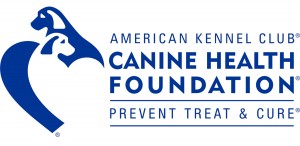Thyroid Testing During Illness
By Sharon Albright, DVM, CCRT Manager of Communications & Veterinary Outreach, AKC Canine Health Foundation
 Many diseases can alter thyroid hormone levels, even though they do not directly involve the thyroid gland. Kidney, gastrointestinal, and orthopedic diseases, and even cancer, can temporarily lower these hormone levels in the bloodstream – a phenomenon known as euthyroid sick syndrome or nonthyroidal illness syndrome. This unfortunately means that an incorrect diagnosis of hypothyroidism can be made if these hormone levels are examined in a single blood sample taken while a dog is experiencing nonthyroidal illness.
Many diseases can alter thyroid hormone levels, even though they do not directly involve the thyroid gland. Kidney, gastrointestinal, and orthopedic diseases, and even cancer, can temporarily lower these hormone levels in the bloodstream – a phenomenon known as euthyroid sick syndrome or nonthyroidal illness syndrome. This unfortunately means that an incorrect diagnosis of hypothyroidism can be made if these hormone levels are examined in a single blood sample taken while a dog is experiencing nonthyroidal illness.
Hypothyroidism is a common hormonal disease that typically affects middle aged dogs. It is defined as inadequate production of thyroid hormones, which help regulate metabolism. The most common causes are inflammation within the thyroid gland (thyroiditis) or replacement of normal thyroid tissue with fat and connective tissue (atrophy). Clinical signs include decreased energy, weight gain, hair loss, and changes in the quality of the skin and haircoat (flaky skin, dull/dry haircoat). An accurate diagnosis requires the presence of appropriate clinical signs plus documented low hormone levels. Thankfully, most dogs respond well to treatment with a synthetic hormone replacement taken as a pill once or twice daily.
If other diseases can falsely lower thyroid hormone levels, but they return to normal once that illness is resolved, how can we ensure an accurate diagnosis of hypothyroidism? Until recently, few studies have examined the timeline of thyroid hormone recovery in dogs. To fill this knowledge gap, AKC Canine Health Foundation (CHF) funded investigators at Virginia-Maryland College of Veterinary Medicine set out to determine precisely when, after illness, standard thyroid function test results return to normal (CHF Grant 02686-A: Pattern of Thyroid Function Tests during Recovery from Acute Nonthyroidal Illness)
Thyroid function tests including total T4 (TT4), free T4 by equilibrium dialysis (fT4ED), total T3 (TT3), and thyroid stimulating hormone (TSH) were measured in dogs representing 18 different breeds that had a nonthyroidal illness severe enough to require hospitalization. Thyroid tests were run on serum (blood) samples collected at hospital admission, once daily while hospitalized, at hospital discharge, and at two and four weeks post-discharge.
Results showed that low total T4 levels in acutely ill dogs recovered quickly, reaching normal levels by hospital discharge in 80% of cases and by two weeks postdischarge in all cases examined. Even better, free T4 levels returned to normal within two days of hospital admission, showing that this measurement is less affected by nonthyroidal illness and rapidly returns to normal levels. Thanks to this simple but important study, dog owners and veterinary professionals can make informed decisions about thyroid testing in dogs. Based on this research, it is best to wait 2-4 weeks after an illness to measure thyroid hormone levels in the dog. If thyroid function must be evaluated before then, free T4 levels are less likely to be affected by non-thyroidal illness and provide the most accurate result.
Learn more about CHF-funded research helping to develop more accurate diagnostics and more effective treatments at akcchf.org/research.
Short URL: https://caninechronicle.com/?p=285232
Comments are closed












